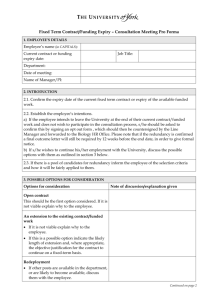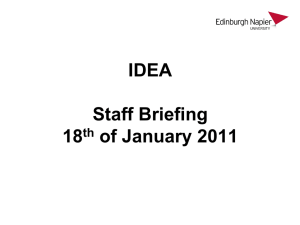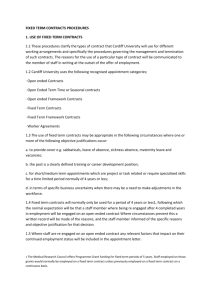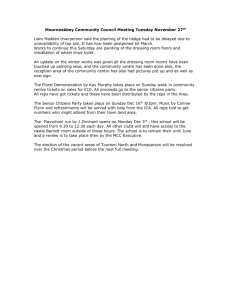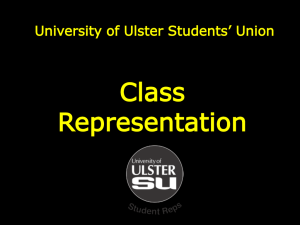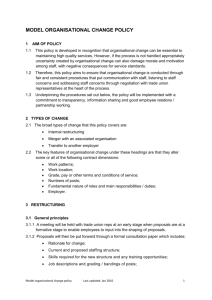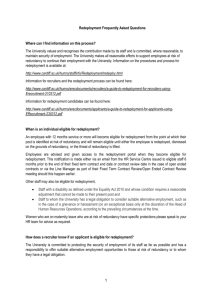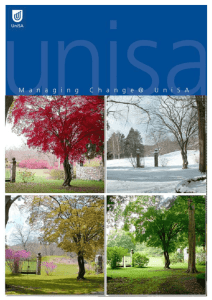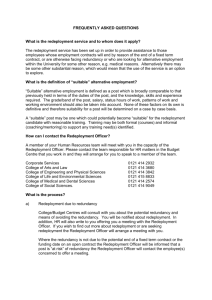8 March 2013
advertisement
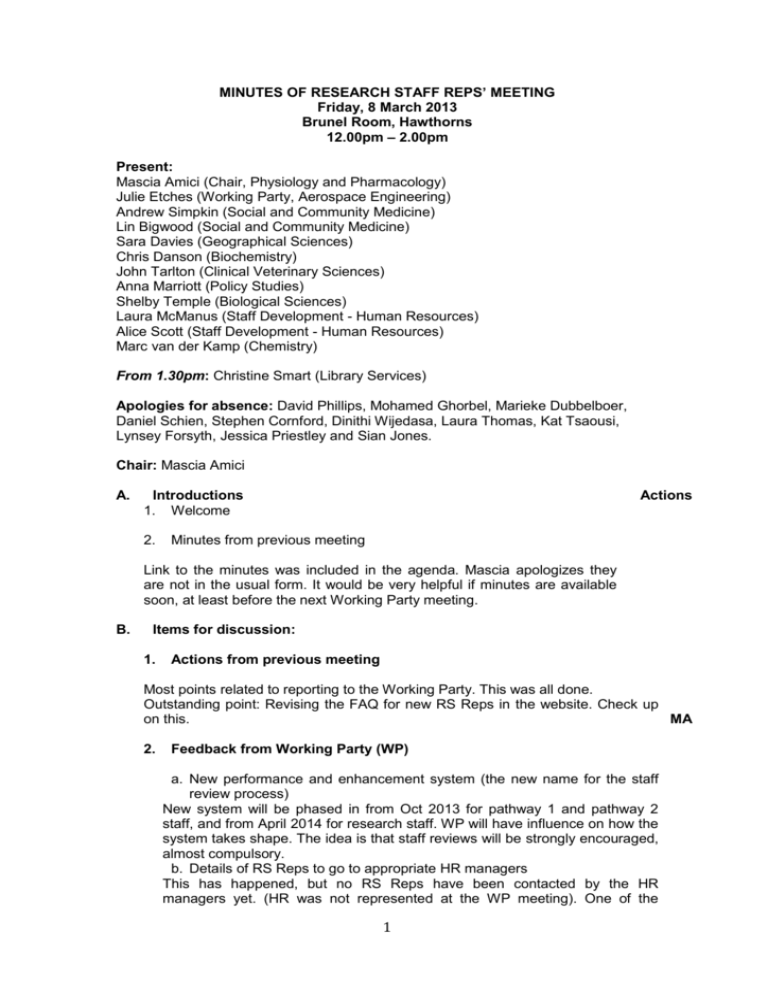
MINUTES OF RESEARCH STAFF REPS’ MEETING Friday, 8 March 2013 Brunel Room, Hawthorns 12.00pm – 2.00pm Present: Mascia Amici (Chair, Physiology and Pharmacology) Julie Etches (Working Party, Aerospace Engineering) Andrew Simpkin (Social and Community Medicine) Lin Bigwood (Social and Community Medicine) Sara Davies (Geographical Sciences) Chris Danson (Biochemistry) John Tarlton (Clinical Veterinary Sciences) Anna Marriott (Policy Studies) Shelby Temple (Biological Sciences) Laura McManus (Staff Development - Human Resources) Alice Scott (Staff Development - Human Resources) Marc van der Kamp (Chemistry) From 1.30pm: Christine Smart (Library Services) Apologies for absence: David Phillips, Mohamed Ghorbel, Marieke Dubbelboer, Daniel Schien, Stephen Cornford, Dinithi Wijedasa, Laura Thomas, Kat Tsaousi, Lynsey Forsyth, Jessica Priestley and Sian Jones. Chair: Mascia Amici A. Introductions 1. Welcome 2. Actions Minutes from previous meeting Link to the minutes was included in the agenda. Mascia apologizes they are not in the usual form. It would be very helpful if minutes are available soon, at least before the next Working Party meeting. B. Items for discussion: 1. Actions from previous meeting Most points related to reporting to the Working Party. This was all done. Outstanding point: Revising the FAQ for new RS Reps in the website. Check up on this. MA 2. Feedback from Working Party (WP) a. New performance and enhancement system (the new name for the staff review process) New system will be phased in from Oct 2013 for pathway 1 and pathway 2 staff, and from April 2014 for research staff. WP will have influence on how the system takes shape. The idea is that staff reviews will be strongly encouraged, almost compulsory. b. Details of RS Reps to go to appropriate HR managers This has happened, but no RS Reps have been contacted by the HR managers yet. (HR was not represented at the WP meeting). One of the 1 reasons and goal of this is that new staff should be notified that RS Reps exist and who their RS Reps are. c. New acceptable behaviours policy Vikki Layton from HR has developed the policy (previously known as ‘bullying and harassment policy’). She would like to help us with dissemination, but there are no further details yet. We should get back to her (and Tracy Brunnock) about this. MA d. University email address existence after leaving The issue is that email addresses and inboxes will cease to exist upon redundancy. This is an issue, for example when you have used the email address as corresponding author information on publications. An email about this was going to be sent (via Guy Orpen) to IT, but nothing has changed yet. One solution can be to be given honorary status for e.g. 12 months, but not all departments will do this. The new gmail system should solve this and there will supposedly be no need to be given honorary status in order to receive emails after leaving UoB. 3. Redeployment and e-recruit Working Party discussed this and had a short demo of the redeployment pool system. Importantly, it turns out that (currently) you need to create multiple profiles if you, for example, want to tick more than one of the ‘pathway 1’, ‘pathway 2’ and ‘support staff’ boxes. If you have multiple boxes ticked, it would not fit job profiles that have only one of these indicated and you would not be offered jobs. This is far from ideal. It should be made clear to people, and ideally, the responsible HR people should take this into account. Perhaps the system should be changed so that you cannot tick more than one box. (Alice S. clarifies that the top of the form contains things where you can tick multiple boxes, such as ‘areas’, but the bottom of the form contains several items where you should only tick one. If you are flexible, you may need about a dozen profiles!) The current matching process is something that still being and needs to be worked on. Matching is in the hands of HR; HR should communicate with the person(s) advertising the job and more checks are needed. There are 60-70 people in the redeployment pool at any one time across UoB, so it should be possible for HR to check more individually. Experience has shown that people can get offered completely inappropriate jobs, so how often does it occur that they don’t get appropriate jobs offered? The redeployment system doesn’t stop you from signing up before your redundancy notice period, but you are not entitled to jobs through redeployment until then. (You can still apply of course, just not through redeployment.) Not applying for a job that is offered to you should not affect redundancy, especially if you indicate that the job is inappropriate, but not sure about employment law on this point. Anna M. relates a case of someone who didn’t want to apply to a full-time job (for child-care reasons) was told she would not get redundancy. See also next agenda point. 4. Contract renewals (and redundancy) 2 Many RS staff do not know when they will be made redundant or when their contract is renewed. Some people get a letter announcing redundancy or contract renewal (on time), others don’t. Often no information is sent out for short extensions. The problems here can lie at multiple levels of communication within UoB (Departments / PIs, HR, Finance). Redundancy letters should be sent before the redundancy notice period (3 months if you’ve worked at the university for less than 5 years). The system in HR should automatically trigger this a month before, but Julie points out that this may not be enough for open-ended contracts, as these require more formal procedures (e.g. 2 meetings with line manager). Please send any specific cases you can find regarding redundancy and contract renewal notices to the Working Party (Julie Etches) before they next meet (22 nd May). Cases should ideally be less than a year old. Cases will be kept generic, but it will be good if specific cases can be traced (e.g. by name) afterwards. It would be great if RS could themselves see exactly when current funding runs out, e.g. through PIMS. All The Social and Community Medicine intranet has some useful information about redundancy and related issues. It would be good if we can put something similar on the RS website: a clear, simplified guide on redundancy and what (should) happen around it, also mentioning the redeployment pool. Julie E will try to draft something, Lin Bigwood is happy to help (at least send the information from the Social and Community Medicine intranet). JE & LB 5. Christine Smart: UoB open access Christine Smart, from Library Services, was asked to manage UoB transition to Open Access (as required by RCUK for research they fund from April 1st 2013). She explains what this is all about, and we have a discussion afterwards which gives her some useful feedback. 6. Any other business: Teaching requirements for research staff Teaching ‘requirements’ for RS are different in different schools/departments. Some RS would like to do some teaching but are not allowed to, others are expected/told to do teaching but don’t really want to. Some contracts (often open-ended) may state that staff can be asked to do up to 6 hours of teaching. But several research councils do not allow research staff paid through their grants to be expected to do teaching as part of their job. RS, especially research assistants and associates, should never be forced to do teaching, it should always be voluntary. Conversely, if RS want to do teaching (to get relevant experience) and there is a reasonable opportunity, they should be allowed to. The issue of forced/expected teaching may become particularly relevant in the near future, as the University wants more students, but doesn’t have enough teaching staff to support them. The risk is that RS will be used more heavily, and the additional risk may be that there will be less (teaching) lecturer jobs! 3 Not long ago, there was a proposal for UPaRC (University Planning and Resources Committee) to standardize payment for those doing timetabled teaching such as lectures and tutorials. The proposal was pulled (perhaps because paying RS staff extra for teaching is a problem for HR/Finance). All RS Reps should try to ask RS in their department the following (with teaching defined as timetabled activities such as lectures, labs, workshops and tutorials, or as being registered as supervisor for project students): 1) Are you doing any teaching? 2) Are you expected to or prevented from doing teaching? All If RS Reps can get information on the department guidelines regarding using RS for teaching, please do so (e.g. by contacting your Head of Department). All relevant information gathered should be sent to the Working Party. All 4
